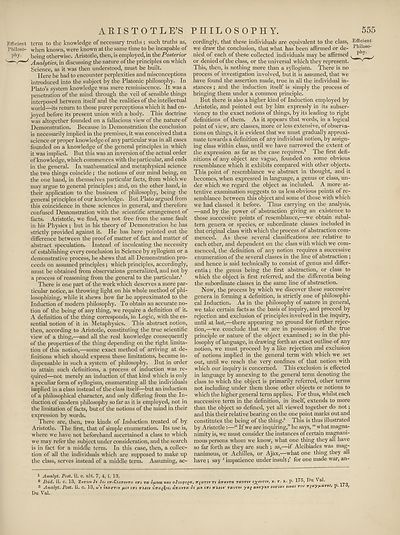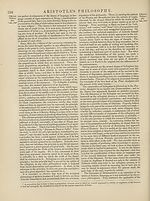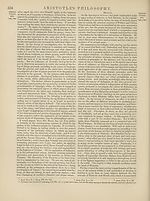Encyclopaedia Britannica > Volume 3, Anatomy-Astronomy
(563) Page 555
Download files
Complete book:
Individual page:
Thumbnail gallery: Grid view | List view

A R I S T O T L E’S PHILOSOPHY.
555
Efficient term to the knowledge of necessary truths ; such truths as,
Philoso- when known, were known at the same time to be incapable oi
Phy- being otherwise. Aristotle, then, is employed, in the Posterior
Analytics, in discussing the nature of the principles on which
Science, as it was then understood, must be built.
Here he had to encounter perplexities and misconceptions
introduced into the subject by the Platonic philosophy. In
Plato’s system knowledge was mere reminiscence. It was a
penetration of the mind through the veil of sensible things
interposed between itself and the realities of the intellectual
world—its return to those purer perceptions which it had en¬
joyed before its present union with a body. This doctrine
was altogether founded on a fallacious view of the nature of
Demonstration. Because in Demonstration the conclusion
is necessarily implied in the premises, it was conceived that a
science or proper knowledge of any particular was in all cases
founded on a knowledge of the general principles in which
it was implied. But this was an inversion of the actual order
of knowledge, which commences with the particular, and ends
in the general. In mathematical and metaphysical science
the two things coincide ; the notions of our mind being, on
the one hand, in themselves particular facts, from which we
may argue to general principles ; and, on the other hand, in
their application to the business of philosophy, being the
general principles of our knowledge. But Plato argued from
this coincidence in these sciences in general, and therefore
confused Demonstration with the scientific arrangement of
facts. Aristotle, we find, was not free from the same fault
in his Physics ; but in his theory of Demonstration he has
strictly provided against it. He has here pointed out the
difference between the proof of matter of fact and matter of
abstract speculation. Instead of inculcating the necessity
of establishing every conclusion in Science by syllogism or a
demonstrative process, he shews that all Demonstration pro¬
ceeds on assumed principles; which principles, accordingly,
must be obtained from observations generalized, and not by
a process of reasoning from the general to the particular.1
There is one part of the work which deserves a more par¬
ticular notice, as throwing light on his whole method of phi¬
losophizing, while it shews how far he approximated to the
Induction of modern philosophy. To obtain an accurate no¬
tion of the being of any thing, we require a definition of it.
A definition of the thing corresponds, in Logic, with the es¬
sential notion of it in Metaphysics. This abstract notion,
then, according to Aristotle, constituting the true scientific
view of a thing,—and all the real knowledge consequently
of the properties of the thing depending on the right limita¬
tion of this notion,—some exact method of arriving at de¬
finitions which should express these limitations, became in¬
dispensable in such a system of philosophy. But in order
to attain such definitions, a process of induction was re¬
quired—not merely an induction of that kind which is only
a peculiar form of syllogism, enumerating all the individuals
implied in a class instead of the class itself—but an induction
of a philosophical character, and only differing from the In¬
duction of modern philosophy so far as it is employed, not in
the limitation of facts, but of the notions of the mind in their
expression by words.
There are, then, two kinds of Induction treated of by
Aristotle. The first, that of simple enumeration. Its use is,
where we have not beforehand ascertained a class to which
we may refer the subject under consideration, and the search
is in fact for a middle term. In this case, then, a collec¬
tion of all the individuals which are supposed to make up
the class, serves instead of a middle term. Assuming, ac¬
cordingly, that these individuals are equivalent to the class,
we draw the conclusion, that what has been affirmed or de¬
nied of each of these collected individuals may be affirmed ,
or denied of the class, or the universal which they represent.
This, then, is nothing more than a syllogism. There is no
process of investigation involved, but it is assumed, that we
have found the assertion made, true in all the individual in¬
stances ; and the induction itself is simply the process of
bringing them under a common principle.
But there is also a higher kind of Induction employed by
Aristotle, and pointed out by him expressly in its subser¬
viency to the exact notions of things, by its leading to right
definitions of them. As it appears that words, in a logical
point of view, are classes, more or less extensive, of observa¬
tions on things, it is evident that we must gradually approxi¬
mate towards a definition of any individual notion, by assign¬
ing class within class, until we have narrowed the extent of
the expression as far as the case requires.2 The first defi¬
nitions of any object are vague, founded on some obvious
resemblance which it exhibits compared with other objects.
This point of resemblance we abstract in thought, and it
becomes, when expressed in language, a genus or class, un¬
der which we regard the object as included. A more at¬
tentive examination suggests to us less obvious points of re¬
semblance between this object and some of those with which
we had classed it before. Thus carrying on the analysis,
—and by the power of abstraction giving an existence to
those successive points of resemblance,—we obtain subal¬
tern genera or species, or subordinate classes included in
that original class with which the process of abstraction com¬
menced. As these several classifications are relative to
each other, and dependent on the class with which we com¬
menced, the definition of any notion requires a successive
enumeration of the several classes in the line of abstraction ;
and hence is said technically to consist of genus and differ¬
entia ; the genus being the first abstraction, or class to
which the object is first referred, and the differentia being
the subordinate classes in the same line of abstraction.
Now, the process by which we discover these successive
genera in forming a definition, is strictly one of philosophi¬
cal Induction. As in the philosophy of nature in general,
we take certain facts as the basis of inquiry, and proceed by
rejection and exclusion of principles involved in the inquiry,
until at last,—there appearing no ground for further rejec¬
tion,—we conclude that we are in possession of the true
principle or nature of the object examined; so in the phi¬
losophy of language, in drawing forth an exact outline of any
notion, we must proceed by a like rejection and exclusion
of notions implied in the general term with which we set
out, until we reach the very confines of that notion with
which our inquiry is concerned. This exclusion is effected
in language by annexing to the general term denoting the
class to which the object is primarily referred, other terms
not including under them those other objects or notions to
which the higher general term applies. For thus, whilst each
successive term in the definition, in itself, extends to more
than the object so defined, yet all viewed together do not;
and this their relative bearing on the one point marks out and
constitutes the being of the thing.3 This is thus illustrated
by Aristotle:—“ If we are inquiring,” he says, “ what magna¬
nimity is, we must consider the instances of certain magnani¬
mous persons whom we know, what one thing they all have
so far forth as they are such ; as,—if Alcibiades was mag¬
nanimous, or Achilles, or Ajax,—what one thing they all
have ; say ‘ impatience under insultfor one made war, an-
Efficient
Philoso¬
phy-
1 Analyt. Post. ii. c. ult. 7, 4, i. 13.
2 Ibid. ii. C. 13, Zi?teiv it in triCxtwovTa tin tcc o/iom %a.t aiiaipogct, *(orov rt airarra ravTor t^eiicnv, x. r. X- p* 175, Du V al.
3 Analyt. Post. ii. C. 13, u\ ixatrrov flit txi xhtov «jravr« it (tn ext srXfov' ravruv ya§ otxayxri outriav titai too xgaypuros, p. ,
Du Val.
555
Efficient term to the knowledge of necessary truths ; such truths as,
Philoso- when known, were known at the same time to be incapable oi
Phy- being otherwise. Aristotle, then, is employed, in the Posterior
Analytics, in discussing the nature of the principles on which
Science, as it was then understood, must be built.
Here he had to encounter perplexities and misconceptions
introduced into the subject by the Platonic philosophy. In
Plato’s system knowledge was mere reminiscence. It was a
penetration of the mind through the veil of sensible things
interposed between itself and the realities of the intellectual
world—its return to those purer perceptions which it had en¬
joyed before its present union with a body. This doctrine
was altogether founded on a fallacious view of the nature of
Demonstration. Because in Demonstration the conclusion
is necessarily implied in the premises, it was conceived that a
science or proper knowledge of any particular was in all cases
founded on a knowledge of the general principles in which
it was implied. But this was an inversion of the actual order
of knowledge, which commences with the particular, and ends
in the general. In mathematical and metaphysical science
the two things coincide ; the notions of our mind being, on
the one hand, in themselves particular facts, from which we
may argue to general principles ; and, on the other hand, in
their application to the business of philosophy, being the
general principles of our knowledge. But Plato argued from
this coincidence in these sciences in general, and therefore
confused Demonstration with the scientific arrangement of
facts. Aristotle, we find, was not free from the same fault
in his Physics ; but in his theory of Demonstration he has
strictly provided against it. He has here pointed out the
difference between the proof of matter of fact and matter of
abstract speculation. Instead of inculcating the necessity
of establishing every conclusion in Science by syllogism or a
demonstrative process, he shews that all Demonstration pro¬
ceeds on assumed principles; which principles, accordingly,
must be obtained from observations generalized, and not by
a process of reasoning from the general to the particular.1
There is one part of the work which deserves a more par¬
ticular notice, as throwing light on his whole method of phi¬
losophizing, while it shews how far he approximated to the
Induction of modern philosophy. To obtain an accurate no¬
tion of the being of any thing, we require a definition of it.
A definition of the thing corresponds, in Logic, with the es¬
sential notion of it in Metaphysics. This abstract notion,
then, according to Aristotle, constituting the true scientific
view of a thing,—and all the real knowledge consequently
of the properties of the thing depending on the right limita¬
tion of this notion,—some exact method of arriving at de¬
finitions which should express these limitations, became in¬
dispensable in such a system of philosophy. But in order
to attain such definitions, a process of induction was re¬
quired—not merely an induction of that kind which is only
a peculiar form of syllogism, enumerating all the individuals
implied in a class instead of the class itself—but an induction
of a philosophical character, and only differing from the In¬
duction of modern philosophy so far as it is employed, not in
the limitation of facts, but of the notions of the mind in their
expression by words.
There are, then, two kinds of Induction treated of by
Aristotle. The first, that of simple enumeration. Its use is,
where we have not beforehand ascertained a class to which
we may refer the subject under consideration, and the search
is in fact for a middle term. In this case, then, a collec¬
tion of all the individuals which are supposed to make up
the class, serves instead of a middle term. Assuming, ac¬
cordingly, that these individuals are equivalent to the class,
we draw the conclusion, that what has been affirmed or de¬
nied of each of these collected individuals may be affirmed ,
or denied of the class, or the universal which they represent.
This, then, is nothing more than a syllogism. There is no
process of investigation involved, but it is assumed, that we
have found the assertion made, true in all the individual in¬
stances ; and the induction itself is simply the process of
bringing them under a common principle.
But there is also a higher kind of Induction employed by
Aristotle, and pointed out by him expressly in its subser¬
viency to the exact notions of things, by its leading to right
definitions of them. As it appears that words, in a logical
point of view, are classes, more or less extensive, of observa¬
tions on things, it is evident that we must gradually approxi¬
mate towards a definition of any individual notion, by assign¬
ing class within class, until we have narrowed the extent of
the expression as far as the case requires.2 The first defi¬
nitions of any object are vague, founded on some obvious
resemblance which it exhibits compared with other objects.
This point of resemblance we abstract in thought, and it
becomes, when expressed in language, a genus or class, un¬
der which we regard the object as included. A more at¬
tentive examination suggests to us less obvious points of re¬
semblance between this object and some of those with which
we had classed it before. Thus carrying on the analysis,
—and by the power of abstraction giving an existence to
those successive points of resemblance,—we obtain subal¬
tern genera or species, or subordinate classes included in
that original class with which the process of abstraction com¬
menced. As these several classifications are relative to
each other, and dependent on the class with which we com¬
menced, the definition of any notion requires a successive
enumeration of the several classes in the line of abstraction ;
and hence is said technically to consist of genus and differ¬
entia ; the genus being the first abstraction, or class to
which the object is first referred, and the differentia being
the subordinate classes in the same line of abstraction.
Now, the process by which we discover these successive
genera in forming a definition, is strictly one of philosophi¬
cal Induction. As in the philosophy of nature in general,
we take certain facts as the basis of inquiry, and proceed by
rejection and exclusion of principles involved in the inquiry,
until at last,—there appearing no ground for further rejec¬
tion,—we conclude that we are in possession of the true
principle or nature of the object examined; so in the phi¬
losophy of language, in drawing forth an exact outline of any
notion, we must proceed by a like rejection and exclusion
of notions implied in the general term with which we set
out, until we reach the very confines of that notion with
which our inquiry is concerned. This exclusion is effected
in language by annexing to the general term denoting the
class to which the object is primarily referred, other terms
not including under them those other objects or notions to
which the higher general term applies. For thus, whilst each
successive term in the definition, in itself, extends to more
than the object so defined, yet all viewed together do not;
and this their relative bearing on the one point marks out and
constitutes the being of the thing.3 This is thus illustrated
by Aristotle:—“ If we are inquiring,” he says, “ what magna¬
nimity is, we must consider the instances of certain magnani¬
mous persons whom we know, what one thing they all have
so far forth as they are such ; as,—if Alcibiades was mag¬
nanimous, or Achilles, or Ajax,—what one thing they all
have ; say ‘ impatience under insultfor one made war, an-
Efficient
Philoso¬
phy-
1 Analyt. Post. ii. c. ult. 7, 4, i. 13.
2 Ibid. ii. C. 13, Zi?teiv it in triCxtwovTa tin tcc o/iom %a.t aiiaipogct, *(orov rt airarra ravTor t^eiicnv, x. r. X- p* 175, Du V al.
3 Analyt. Post. ii. C. 13, u\ ixatrrov flit txi xhtov «jravr« it (tn ext srXfov' ravruv ya§ otxayxri outriav titai too xgaypuros, p. ,
Du Val.
Set display mode to:
![]() Universal Viewer |
Universal Viewer | ![]() Mirador |
Large image | Transcription
Mirador |
Large image | Transcription
Images and transcriptions on this page, including medium image downloads, may be used under the Creative Commons Attribution 4.0 International Licence unless otherwise stated. ![]()
| Encyclopaedia Britannica > Encyclopaedia Britannica > Volume 3, Anatomy-Astronomy > (563) Page 555 |
|---|
| Permanent URL | https://digital.nls.uk/193764667 |
|---|
| Attribution and copyright: |
|
|---|---|
| Shelfmark | EB.16 |
|---|---|
| Description | Ten editions of 'Encyclopaedia Britannica', issued from 1768-1903, in 231 volumes. Originally issued in 100 weekly parts (3 volumes) between 1768 and 1771 by publishers: Colin Macfarquhar and Andrew Bell (Edinburgh); editor: William Smellie: engraver: Andrew Bell. Expanded editions in the 19th century featured more volumes and contributions from leading experts in their fields. Managed and published in Edinburgh up to the 9th edition (25 volumes, from 1875-1889); the 10th edition (1902-1903) re-issued the 9th edition, with 11 supplementary volumes. |
|---|---|
| Additional NLS resources: |
|

